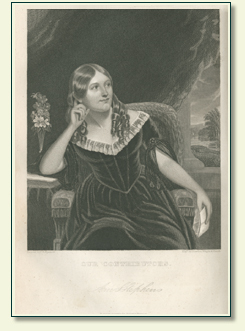|

Charles J. Peterson. “Our Contributors. –
XV. Mrs. Ann S. Stephens,” in Graham’s
Magazine 26 (1844): 234-36, frontispiece.
|
ANN
S. STEPHENS (1810 – 1886)
As a child in her family's Connecticut home, Ann Stephens listened to
her father read aloud in the evenings and resolved to become a writer. After
finishing her studies at the local "dame school," she married
Edward Stephens in 1831 and relocated to Portland, Maine,
where she and her husband co-founded and edited a monthly literary periodical
called the Portland Magazine
and issued a collection of work by local writers.
In 1837 they moved to New York City, and while her husband gave
up editing to work in a customs house, she further pursued her literary
career. She joined the editorial staff at Graham's
and Peterson's magazines
and contributed extensively to several other local periodicals. Many of her
contributions were novels printed in serial form, over twenty-five of which
eventually appeared as full-length volumes. During the early 1860s, she
contracted with the publishing firm Irwin P. Beadle and Company to produce a
seven-book series of "dime novels," and the income she received
from her publications and editorial work comfortably supported her two sons
and husband.
During the Civil War Ann Stephens compiled a Pictorial History of the War for the Union
and chaired a New York
women's committee that advocated rationing and modest living to support
northern troops. She was one of the best-known writers on the New York scene of her
day and died at the home of Charles Peterson (owner of Peterson's Magazine) at the age of
seventy-six.
In 1846, Edgar Allan Poe described her in his “The
Literati of New York City. No. III,” in Godey’s Lady’s Book, v. 33, p. 15:
The
portrait of Mrs. Stephens which appeared in "Graham's Magazine" for
November, 1844, cannot fairly be considered a likeness at all. She is tall
and slightly inclined to embonpoint—an English figure. Her forehead is somewhat low,
but broad; the features generally massive, but full of life and
intellectuality. The eyes are blue and brilliant; the hair blonde and very
luxuriant.
Other portraits appear in:
John S. Hart, ed. Female
Prose Writers of America (1852), plate opposite p. 193.
Sarah J. Hale, ed. Woman’s
Record (1853), p. 796; also 1855 ed.
Frank Leslie’s
Illustrated Newspaper (Aug. 16, 1856), p. 160.
Henry Coppée, ed. A
Gallery of Distinguished English and American Female Poets
(1860), p. 340.
NEXT>
|


